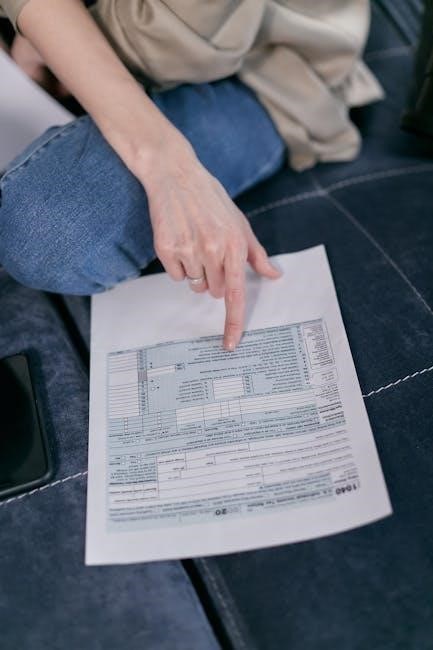A free guide to making your will provides essential templates and legal advice, ensuring your last wishes are respected. Download customizable Word or PDF formats for a secure future.
Understanding the Importance of a Will
A will is a legal document that ensures your final wishes are respected regarding asset distribution, property, and guardianship. It prevents legal disputes and protects your heirs from unnecessary complications. Without a will, the law dictates how your estate is divided, which may not align with your desires. A will allows you to name an executor, specify funeral arrangements, and leave gifts or donations. It also ensures minors or vulnerable individuals are cared for by appointing guardians. Having a will provides peace of mind, knowing your legacy is secure. Free guides offer templates and legal advice, making it easier to create a valid will. They help you avoid errors and ensure compliance with legal requirements, safeguarding your family’s future. Downloading a free will guide is a practical first step in securing your estate’s future.
Overview of the Process
Creating a will involves several straightforward steps, guided by free templates and legal advice. Start by listing your assets and identifying beneficiaries. Choose an executor to manage your estate and consider appointing guardians for minors. Decide on funeral arrangements and any charitable donations. Use a free will guide to download customizable templates in Word or PDF formats. Fill in the details, ensuring clarity and compliance with legal requirements. Sign the document in the presence of witnesses and store it securely. For added security, register your will with the central file. Optional notarization can enhance its validity. Free guides also provide video explanations and legal terms to help you adapt the document accurately. This process ensures your wishes are respected and your family is protected. Downloading a free guide is the first step toward securing your legacy.
Key Benefits of Having a Will
Having a will ensures your assets are distributed according to your wishes, avoiding legal disputes and intestacy laws. It allows you to appoint an executor to manage your estate, ensuring your instructions are carried out. A will also lets you name beneficiaries for specific assets, protecting loved ones from financial uncertainty. Additionally, it enables you to appoint guardians for minor children, ensuring their well-being. A will can reduce estate taxes and prevent family conflicts. Without one, the court decides asset distribution, which may not align with your desires. A free guide helps you create a will efficiently, ensuring peace of mind and legal protection for your family. It safeguards your legacy and provides clarity, making it a crucial document for everyone, regardless of wealth or age. A will is essential for securing your family’s future and honoring your final wishes.

Key Considerations Before Starting Your Will
- Asset Inventory: List all your possessions and properties.
- Beneficiary Selection: Decide who inherits your assets.
- Executor Choice: Appoint someone trustworthy to manage your estate.
- Legal Compliance: Understand regional laws and requirements.
What is a Will and Why is it Necessary?
A will is a legal document that outlines how an individual’s assets, properties, and possessions should be distributed after their death. It is essential for ensuring that one’s wishes are respected and carried out. Without a will, the state may intervene, leading to potential disputes among heirs. A will allows the person to appoint an executor to manage the estate, name beneficiaries for specific assets, and designate guardians for minor children. It also helps in minimizing estate taxes and ensures that charitable donations or sentimental items are handled according to the person’s desires. Creating a will provides clarity, avoids legal complications, and ensures that the deceased’s intentions are honored, making it a crucial step in estate planning.
Who Can Make a Will?
Anyone who is of legal age (typically 18 or older) and of sound mind can make a will. This means the person must understand the nature of their actions and the consequences of their decisions. There are no restrictions based on marital status, wealth, or property ownership. Even individuals with modest assets can benefit from having a will to ensure their wishes are carried out. A will is particularly important for parents of minor children, as it allows them to name a guardian. It is also essential for those who wish to leave specific instructions or gifts to loved ones. Creating a will is a straightforward process, especially with the help of a free guide, and ensures that one’s estate is managed according to their preferences.
What Assets Can Be Included in a Will?
A will allows you to distribute all types of assets according to your wishes. This includes real estate, such as your home or land, financial assets like bank accounts, investments, and retirement funds, as well as personal possessions such as jewelry, vehicles, artwork, and heirlooms. You can also include business interests, shares in companies, or partnership stakes. Additionally, intangible assets, such as copyrights or patents, can be included. Digital assets, like social media accounts or cryptocurrency, are increasingly being addressed in wills. It is important to list all significant assets to ensure they are distributed as you intend. Including these details helps prevent disputes and ensures your estate is managed according to your preferences. Properly documenting these assets is a crucial step in creating a comprehensive will.

Types of Wills
There are several types of wills, including holographic, mutual, notarial, and digital wills, each offering different methods to ensure your estate is distributed according to your wishes.
Holographic Will (Handwritten Will)
A holographic will is a type of will that is entirely handwritten by the testator. It is recognized in some jurisdictions and can be a straightforward way to express your wishes. For a holographic will to be valid, it must be entirely in your handwriting, signed, and dated. This type of will does not require witnesses, which can make it simpler to create. However, it is essential to ensure clarity and completeness to avoid legal challenges. While holographic wills can be practical for small estates, they may not be suitable for complex situations or large assets. Legal advice is recommended to ensure compliance with local laws and to avoid potential disputes. Always verify the legal requirements in your jurisdiction before proceeding with a holographic will.
Mutual Wills (For Couples)
Mutual Wills (For Couples)
Mutual wills are legal documents created by two individuals, typically couples, to ensure their shared wishes are carried out after their passing. These wills are often identical or mirror each other, reflecting a joint agreement on how assets, property, and other matters should be handled. Mutual wills are commonly used by spouses or partners who want to protect each other and ensure their estate is distributed according to their mutual desires. While mutual wills can provide clarity and peace of mind, they can also be inflexible, as they may restrict the surviving partner from making changes after one partner’s death. It’s essential to consult a legal professional to draft mutual wills properly, as they must comply with local laws and accurately reflect the couple’s intentions. Mutual wills are a thoughtful way to honor shared commitments but may not suit all situations.
Notarial Will (Through a Notary)
A notarial will is a type of will that is prepared and authenticated by a notary, ensuring its legality and enforceability. This process involves the notary witnessing the signing of the will and verifying the testator’s capacity and intent. Notarial wills are considered highly secure and are often recommended for complex estates or when there are potential disputes. The notary ensures all legal formalities are met, reducing the risk of challenges after death. The notary also retains a copy of the will, providing an additional layer of security. This type of will is particularly advantageous in countries where notarization is a legal requirement or strongly recommended. Consulting a notary simplifies the process and guarantees compliance with local laws, offering peace of mind for both the testator and beneficiaries. Notarial wills are a reliable choice for ensuring one’s wishes are respected.
Digital Will (Electronic Format)
A digital will, or electronic will, is a modern alternative to traditional paper-based wills. It allows individuals to create, sign, and store their wills electronically. This format is particularly useful for those comfortable with technology and seeking convenience. Digital wills can be created using online platforms or software, often with templates that guide the user through the process. However, the legality of digital wills varies by jurisdiction, and not all regions recognize electronic signatures for wills. In places where digital wills are valid, they must still meet legal requirements, such as witness signatures and proper authentication. Storage is another consideration—digital wills should be kept securely, ideally with encryption and backup solutions. Despite their advantages, consulting a legal professional is crucial to ensure compliance with local laws and avoid potential disputes.

Benefits of a Free Will Guide
A free will guide offers essential templates and step-by-step instructions, simplifying the process of creating a legally binding document. It saves time and reduces costs.
Access to Free Templates (Word, PDF, Excel)
A free will guide provides convenient access to downloadable templates in popular formats like Word, PDF, and Excel. These templates are designed to simplify the will-making process, offering pre-drafted sections for essential details such as asset distribution, beneficiary designations, and executor appointments. Word and Excel templates allow for easy customization, enabling users to tailor the document to their specific needs. PDF formats are ideal for final versions, ensuring the content is tamper-proof and professionally presented. These templates guide users through organizing their information, reducing the risk of oversight. They are particularly useful for individuals seeking a cost-effective and straightforward way to create a legally valid will without incurring legal fees. By leveraging these resources, users can ensure their wishes are clearly documented and easily understood.

Steps to Create Your Will
Creating a will involves organizing your assets, designating beneficiaries, appointing an executor, and legally finalizing the document with proper signatures and witnesses to ensure validity.
Step 1: List Your Assets
Begin by creating a comprehensive inventory of all your possessions, including property, bank accounts, investments, vehicles, jewelry, and other valuables. This step ensures nothing is overlooked. Start by categorizing assets into tangible (physical items) and intangible (financial holdings). Make note of account numbers, balances, and ownership details. Include real estate properties with addresses and approximate values. Don’t forget digital assets like cryptocurrency or online accounts. Organize items into groups, such as “Primary Residence,” “Savings Accounts,” or “Personal Effects.” Be precise with descriptions and consider attaching appraisals for high-value items. This inventory serves as the foundation for distributing your estate according to your wishes. Regularly updating this list ensures your will remains accurate and reflects your current financial situation.
Step 2: Choose Your Beneficiaries
After listing your assets, identify who will inherit each item or portion of your estate. Beneficiaries can include family members, friends, or charitable organizations. Be specific when naming individuals, including their full names and relationships to avoid disputes. Consider alternative beneficiaries in case your primary choice predeceases you. For minor children, designate a trusted guardian or trustee to manage their inheritance until they reach legal age. If you wish to leave assets to charities, specify the organizations and the proportions of your estate they should receive. Ensure your choices align with your values and priorities. Documenting your beneficiaries clearly prevents misunderstandings and ensures your wishes are honored. Review and update your selections regularly, especially after major life changes like births, marriages, or divorces.
Step 3: Appoint an Executor
Selecting an executor is a crucial step in creating your will. This person will oversee the distribution of your estate, manage paperwork, pay debts, and ensure your wishes are carried out. Choose someone trustworthy, organized, and capable of handling legal and financial responsibilities. Ideally, this should be a close family member, friend, or professional, such as a lawyer or notary, who is familiar with estate management. Consider their ability to remain impartial and communicate effectively with beneficiaries. If you appoint a professional, be aware of potential fees. Inform the executor of your decision and ensure they agree to take on the role. Naming an alternate executor is also wise in case your first choice is unable to serve. Their contact information should be included in your will for clarity and accessibility.
Step 4: Write and Sign Your Will
Drafting your will requires clarity and precision to ensure your wishes are accurately reflected. Include details about your assets, beneficiaries, executor, and any specific instructions for distribution or management. Use clear language to avoid ambiguity. Once satisfied with the content, sign your will in the presence of at least two witnesses who are not beneficiaries or related to you. Witnesses must acknowledge and sign the document, confirming your mental capacity and voluntary decision. Add the date to the will for validity. Notarization is optional but recommended to enhance authenticity. Store the signed will securely, such as in a fireproof safe or with your notary, and inform your executor of its location. Ensure the document adheres to local legal requirements for recognition and enforcement.

Legal Requirements for a Valid Will
A valid will requires your signature, witnessed and signed by two independent individuals. Notarization is optional but recommended for added authenticity and legal enforceability.
Signature and Date Requirements
A valid will must be signed by you, the testator, in the presence of at least two independent witnesses. These witnesses should not be beneficiaries or spouses of beneficiaries to avoid conflicts of interest. The date of signing must be clearly stated to ensure the will is recognized as your most recent version. Witnesses must also sign and date the document, confirming they observed you signing it voluntarily and without coercion. While notarization is not always mandatory, it adds an extra layer of authenticity and can simplify the probate process. Ensure all signatures are placed at the end of the document to maintain its validity under the law.

Importance of Legal Advice
Consulting a lawyer or notary ensures your will is legally valid, covers all complexities, and protects your wishes from disputes. They provide expert guidance tailored to your situation.
When to Consult a Notary or Lawyer
Consulting a notary or lawyer is essential when your estate is complex, such as owning multiple properties, businesses, or significant assets; If you have family conflicts, blended families, or potential disputes, legal advice ensures your will is watertight. A professional can guide you through appointing guardians for minor children or creating provisions for individuals with special needs. If your estate involves international assets, a lawyer can navigate cross-border legal issues. Additionally, if you suspect your will might be contested, a notary or lawyer can help you anticipate and mitigate risks. Their expertise ensures compliance with legal requirements and protects your wishes from being challenged. Don’t hesitate to seek professional help for peace of mind and a legally sound will.

Storage and Registration of Your Will
Store your will in a secure, fireproof location like a safe or safety deposit box. Consider registering it with a central registry to ensure it’s easily found.
How to Store Your Will Safely
Proper storage of your will is crucial to ensure its accessibility and integrity. Consider keeping the original document in a fireproof, water-resistant safe at home or a safety deposit box at your bank. Avoid storing it in a locked box without sharing the combination with your executor or trusted individuals. Do not keep your will in a location that could be easily damaged, such as a basement prone to flooding. Inform your executor or a trusted family member about the storage location to prevent it from being lost or destroyed. Avoid storing it in a place that is too remote or inaccessible. Keeping a digital copy in a secure cloud storage service can also serve as a backup, but ensure it is encrypted for privacy. Proper storage helps prevent loss, damage, or disputes over its validity.
Registering Your Will with the Central File
Registering your will with the central file is a highly recommended step to ensure its recognition and accessibility after your passing. This process involves submitting your will to a centralized registry, which maintains records of wills for legal and administrative purposes. You can typically register your will through a notary or legal professional, who will guide you through the process. The registry will store key details, such as the existence and location of your will, without revealing its contents. This ensures that your wishes are respected and prevents disputes or loss of the document. In some regions, you may need to provide a copy of the will or specific identification documents for registration. Once registered, your executor or heirs can easily locate and access the will, guaranteeing its legal validity and execution. Registration adds an extra layer of security and peace of mind.

Common Mistakes to Avoid
Common errors include failing to sign or date the will, not appointing an executor, omitting key assets, using unclear language, and not having proper witnesses.
Errors That Can Invalidate Your Will
One of the most common errors is failing to properly sign and witness the will, which can render it invalid under legal standards. Another mistake is not updating the will after significant life changes, such as divorce, marriage, or the birth of a child. Using ambiguous or unclear language in the document can lead to disputes and legal challenges. Additionally, omitting key assets or failing to name an executor can cause complications. Many people also make the error of not having their will witnessed by two independent individuals, which is a legal requirement in most jurisdictions. Finally, not storing the will in a safe and accessible location can lead to it being lost or destroyed. These errors highlight the importance of careful planning and legal advice when creating a will.

Role of Notaries in Will Creation
Notaries ensure the will is legally sound by verifying the testator’s capacity and witnessing signatures. They provide expert guidance and secure storage for the document.
Services Offered by Notaries
Notaries provide expert legal advice to ensure your will aligns with your wishes and complies with the law. They draft and review the document, witnessing signatures to validate it. Notaries also offer secure storage options for your will and assist with registration in the Central File. Additionally, they can mediate discussions with beneficiaries and ensure all legal formalities are met. Their services often include explaining complex legal terms and helping you understand the implications of your decisions. By involving a notary, you can avoid common mistakes and ensure your will is legally binding. Their professional guidance provides peace of mind, knowing your estate is handled according to your intentions.



Be the first to reply